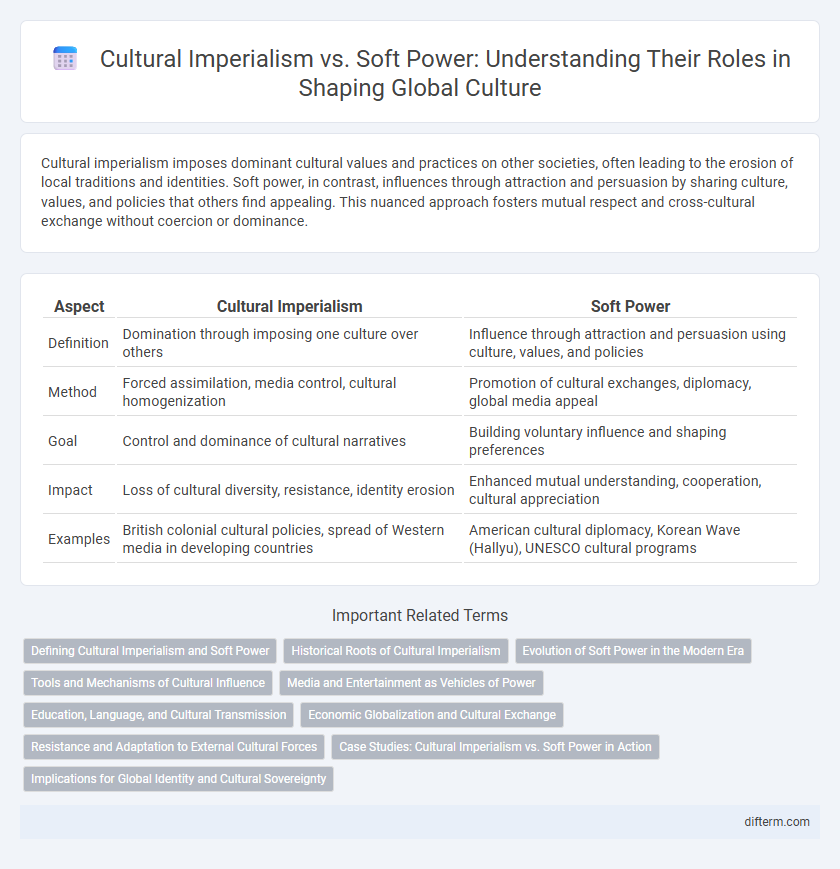Cultural imperialism imposes dominant cultural values and practices on other societies, often leading to the erosion of local traditions and identities. Soft power, in contrast, influences through attraction and persuasion by sharing culture, values, and policies that others find appealing. This nuanced approach fosters mutual respect and cross-cultural exchange without coercion or dominance.
Table of Comparison
| Aspect | Cultural Imperialism | Soft Power |
|---|---|---|
| Definition | Domination through imposing one culture over others | Influence through attraction and persuasion using culture, values, and policies |
| Method | Forced assimilation, media control, cultural homogenization | Promotion of cultural exchanges, diplomacy, global media appeal |
| Goal | Control and dominance of cultural narratives | Building voluntary influence and shaping preferences |
| Impact | Loss of cultural diversity, resistance, identity erosion | Enhanced mutual understanding, cooperation, cultural appreciation |
| Examples | British colonial cultural policies, spread of Western media in developing countries | American cultural diplomacy, Korean Wave (Hallyu), UNESCO cultural programs |
Defining Cultural Imperialism and Soft Power
Cultural imperialism refers to the dominance of one culture over others, often through media, language, and consumer products that reshape local values and identities. Soft power, a term coined by Joseph Nye, involves influencing others through attraction and persuasion using cultural appeal, political values, and foreign policies rather than coercion or force. Both concepts highlight the strategic use of culture in global relations, with cultural imperialism emphasizing domination and soft power focusing on voluntary acceptance.
Historical Roots of Cultural Imperialism
Cultural imperialism traces its roots to the colonial era when dominant powers imposed their languages, religions, and customs on subjugated populations, reshaping indigenous identities and social structures. This historical process established patterns of cultural dominance that persist in contemporary global relations through media, education, and economic influence. Unlike cultural imperialism's coercive nature, soft power leverages attraction and persuasion, drawing from a nation's culture, political values, and foreign policies to influence others voluntarily.
Evolution of Soft Power in the Modern Era
Soft power has evolved from traditional cultural imperialism by emphasizing attraction through values, media, and diplomacy rather than coercion or economic pressure. In the modern era, digital platforms, global entertainment, and educational exchanges have become crucial tools for countries to project soft power and influence international public opinion. This shift reflects a strategic use of culture that respects sovereignty while shaping global narratives and norms.
Tools and Mechanisms of Cultural Influence
Cultural imperialism relies on dominant nations imposing their values and norms through media, language, and consumer products, often leveraging economic and political power to shape local cultures. Soft power employs more subtle mechanisms such as cultural exchanges, international education programs, and global entertainment to persuade and attract rather than coerce. Both approaches use tools like film, music, and social media platforms to spread cultural narratives, but soft power emphasizes mutual understanding and voluntary adoption over directive influence.
Media and Entertainment as Vehicles of Power
Media and entertainment serve as potent vehicles of cultural imperialism and soft power by shaping global narratives and influencing societal values. Hollywood films, television shows, and streaming platforms disseminate Western ideals and lifestyles, often overshadowing local cultures and reinforcing American cultural dominance. Conversely, strategic cultural exports can foster mutual understanding and diplomacy, allowing nations to project soft power and build international alliances through the appeal of their creative industries.
Education, Language, and Cultural Transmission
Cultural imperialism often manifests through the dominance of one country's education system and language, overshadowing local traditions and marginalizing indigenous knowledge. Soft power leverages educational exchange programs, language courses, and cultural institutions to promote mutual understanding and influence without coercion. The transmission of culture through these means shapes global perceptions and values, balancing respect for diversity with the spread of dominant cultural norms.
Economic Globalization and Cultural Exchange
Economic globalization accelerates cultural exchange by facilitating the flow of goods, services, and media across borders, enabling soft power to shape global perceptions through attractive cultural products. Cultural imperialism, however, manifests as dominant economies impose their cultural norms and consumer habits, risking the erosion of local identities and traditions. The dynamic interplay between economic globalization and cultural exchange determines whether influence is exercised as coercive dominance or as mutually beneficial soft power.
Resistance and Adaptation to External Cultural Forces
Resistance to cultural imperialism often manifests through the preservation of indigenous languages, traditions, and local arts, which act as barriers to external cultural domination. Adaptation to soft power involves selectively incorporating foreign elements into existing cultural frameworks, creating hybrid identities that negotiate global influence while maintaining local authenticity. Communities employ both resistance and adaptation as dynamic strategies to assert agency against homogenizing global trends and sustain cultural diversity.
Case Studies: Cultural Imperialism vs. Soft Power in Action
The United States' global spread of Hollywood films exemplifies cultural imperialism by dominating local cultures with Western values, while Japan's promotion of anime and cuisine through soft power fosters cultural exchange without coercion. China's Confucius Institutes illustrate soft power by advancing language and culture to build favorable international relations, contrasting with France's historical cultural imperialism via colonial imposition of language and customs. Case studies reveal soft power's effectiveness in nurturing mutual respect, whereas cultural imperialism often provokes resistance and cultural erosion in the target societies.
Implications for Global Identity and Cultural Sovereignty
Cultural imperialism often threatens global identity by imposing dominant cultural norms that erode local traditions and diminish cultural sovereignty. In contrast, soft power fosters mutual respect and cultural exchange, enabling nations to maintain their unique identities while engaging globally. The balance between these forces shapes how societies preserve cultural heritage amid increasing globalization.
cultural imperialism vs soft power Infographic

 difterm.com
difterm.com